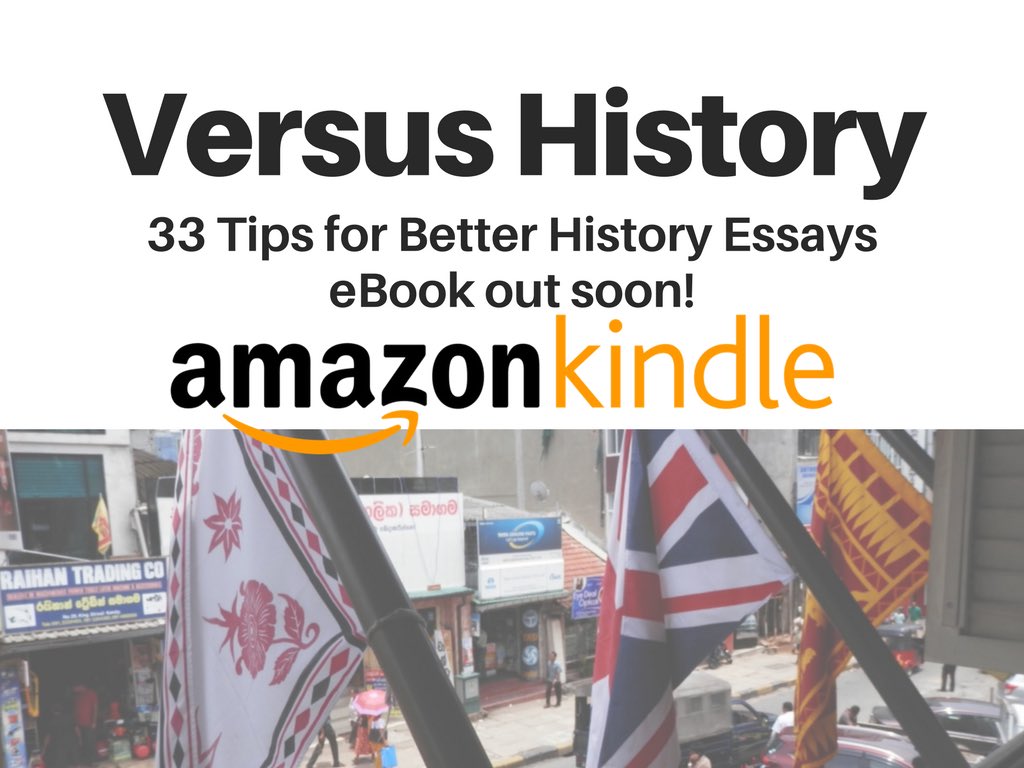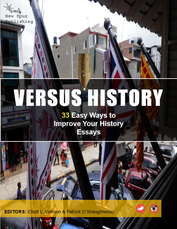|
BOOK LAUNCH: 33 Easy Ways to Improve Your History Essays
We are very proud to announce the release of our new book – Versus History: 33 Easy Ways to Improve Your History Essays. We have spent a great many years deconstructing and reconstructing student essays, so much so that we have developed a library of simple, tried and tested, ‘go to’ tips that enable the better writing of history. Determined in our mission to help our students, and those out there whom we don’t teach directly, perfect the essay-writing skills required at post-16 level, we have compiled many of our best tips in this publication. Our twin hopes are that a) students will find these tips useful and incorporate them into their essay planning, and b) overworked teachers will see time-saving instructional value in using these tips in the classroom. You can download or order print copies of Versus History: 33 Easy Ways to Improve Your History Essays from Amazon.co.uk. Please feel free to get in touch with us at www.versushistory.com or @versushistory if you have any questions or suggestions. Don’t forget to listen to our weekly Versus History podcasts on iTunes. Sincerely and with Best wishes, Elliott L. Watson & Patrick O’Shaughnessy
0 Comments
 The Causal Web Here at Versus History, we spend a long time emphasising the symbiotic roles of cause and consequence in the creation of history: consequences require causes and thus causes can’t, by definition, exist without consequences. Something of a basic, but watertight piece of cyclical, deductive reasoning. Since the path of history is beset on all sides by the perils of determining cause and consequence, I thought I’d write a few of my thoughts down. In a number of our podcasts, as well as a few chapters of our new publication – 33 Easy Ways to Improve Your History Essays – Patrick and I have discussed the importance of moving beyond simple description or explanation of causes and consequences, towards a more evaluative analysis. What we mean by this is simple: we want our students to create, what Richard Evans calls in his book, In Defence of History, a ‘hierarchy of causes’. I think it is safe to say that history is never mono-causal but multi-causal. As a result, it is vital when answering a question linked to cause that students determine a series of causes to be explored. What’s more, they must, and this is crucial, also determine a hierarchical framework within which to set these causes; a framework constructed by answering the following question: Which cause is the most significant in relation to the others and why? Additionally, though they may judge one cause more important than the other (by virtue of causal relativism and the assigning of historical ‘value’), the student must also admit that there is a web of causes that it may be impossible to separate. Since it can only be the time-traveller who is able to return to a time period and cancel a cause – removing it from history – we can never honestly imagine a set of perfectly separate causes because we can never truly suppose what might have happened had one of the many causes never existed. Thus it is the responsibility of the history student to determine the key causes and then to assess their significance in relation to one another. Identifying the key causes carries an implicit judgement: that ALL of the causes which have been selected are important in some respect or another. This assessment is of profound significance because it is a powerful acknowledgement that, while one cause may be fundamentally more important than the rest (however that may be adjudged to be true), it is also true that every cause under discussion must also retain value – otherwise why discuss it at all? And so, it is imperative that all students of history determine a hierarchy of causation (and consequence) when writing history, but it is prudent to also acknowledge that a web of causes (and consequences), impossible to untangle, exists and that this web may even supersede the importance of any one cause. Best wishes, Elliott L. Watson (@thelibrarian6) #VersusHistory  The publication date of our first book is very nearly here! The result of 12 months planning and enriched by our years of experience teaching History across the age and ability range, the book includes 33 strategies for helping students improve the quality of their written work. It has been a pleasure to write and a real milestone for us! Having thoroughly enjoyed the Podcast series thus far - with some lively debate on topics as diverse as Malcolm X, The Suffragettes and the Norman Conquest - we felt it time to release our first publication on the hot topic of essay writing and the disciplinary concepts that underpin it. Every Post-16 History course in every country utilises essays as an assessment medium. There is no getting away from it - nor would we want to. Writing essays can be highly rewarding, enriching and enjoyable. Therefore, we really hope that the content of the book will be well received. Fingers crossed!
With the 2018 exam season nearly upon us, it probably could not have come at a better time for us, our students and those who follow the Versus History project. Feel free to get in touch for more details - we might even send you a sample chapter ... maybe even a free T-Shirt! You never know your luck! Oh, by the way, the book itself will be available via the Amazon Kindle store. Take care! Patrick & Elliott |
Categories
All
Archives
April 2024
|

 RSS Feed
RSS Feed